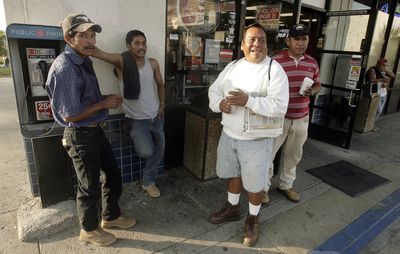Day laborers struggle in tough economy
Recession has made a difficult life harder

NASHVILLE, Tenn. – Dawn has not yet arrived. Only the light from a gas station illuminates Victor Marquina, who walked in the darkness from his garage apartment. He is a day laborer looking for work.
Marquina sits on the curb, sipping coffee as others trickle in on a warm recent morning. They wait, talking among themselves, but there is little work to be had.
Day laborers, berry pickers, taxi drivers and service industry workers like Marquina are the underbelly of the nation’s economy, the underrepresented and unwanted in American society. And now they are hurting.
Nationwide, the economic slowdown has hit them hard – especially Hispanics. The real estate construction deceleration has spurred the loss of about 250,000 jobs in the past few years, according to the Pew Hispanic Center. For day laborers, just getting by has morphed into barely eating, barely surviving.
“They are the new Americans,” says Megan Macaraeg, director of Middle Tennessee Jobs for Justice. “These workers are what makes the world go ’round. We have forgotten where we come from, who we are and the value of the work. They wash our cars, give us our rides from the airport and help in our building.”
On any given day, according to studies, there are an estimated 120,000 day laborers – both legal and illegal – in the United States. They are bricklayers, painters, landscapers, anything their bosses want them to be.
During the height of the construction boom, they earned $12 or more an hour and held steady employment. Now, they earn much less doing work like washing cars or cleaning bathrooms.
On this day, like most days, Victor Marquina is the first one to arrive at the gas station, a location that serves as an informal day-labor hiring site in Nashville. The 45-year-old man is the senior member of this set of day laborers, having worked this corner for more than a dozen years. He’s now a victim of the recession, earning just a portion of what he made in years past.
“There’s no work,” Marquina says in Spanish. “Before, we could pick who we want to work for. There were more jobs than people.”
Hours and even days go by before the workers waiting at the gas station get hired. Some days, there are more than 50 people waiting and fewer than half get hired.
A day’s work is the difference between eating a good meal and skipping one for this hidden demographic.
“If there’s no money, you can’t go to the Chinese buffet,” says Jose Valenciano, also waiting for work. “No work means it’s the Maruchan noodle cups.”
The hidden economy always has a segment of people who are struggling to make it.
“When there’s a recession it exacerbates what already is an existing struggle,” says Sekou Franklin, assistant professor of political science at Middle Tennessee State University. “A recession brings more people off the shelf into that struggle.”
Some who can’t find jobs move on to other states. With little in the way of local job prospects, Marquina took a gamble and recently went to New Jersey to pick blueberries. It wasn’t what he expected. The pay was $30 a day for backbreaking work from morning to evening, filling up crates as the sun beat down.
He asked a church in New Jersey for help and it paid his bus ticket back.
On this day at Marquina’s corner, only a handful is picked up for jobs.
An employer in a pickup truck hires a day worker and leaves quickly. A blue minivan with a sign on its door about building patios swoops in. Workers jump in and the van zooms away.
Shortly after 11 a.m., police tell the laborers to disperse. Once in a while, the laborers say, police come in undercover as employers in a truck or van and arrest them. Still, it’s better than the alternative offered in their home countries.
Marquina, from El Salvador, was a victim of his country’s civil war that prompted an exodus in the 1980s of many who were granted protection in the U.S. Marquina buried 12 relatives, including a brother, a sister and a son, who were victims of the guerrilla firing squads.
It was then he decided to come to the U.S.
He’s tried to get legal residency but had no luck despite paying for a lawyer.
“I can’t go back,” he says. “I am here with my family and that’s the main thing. We ask God for stability but if we have to, we eat bread and water.”